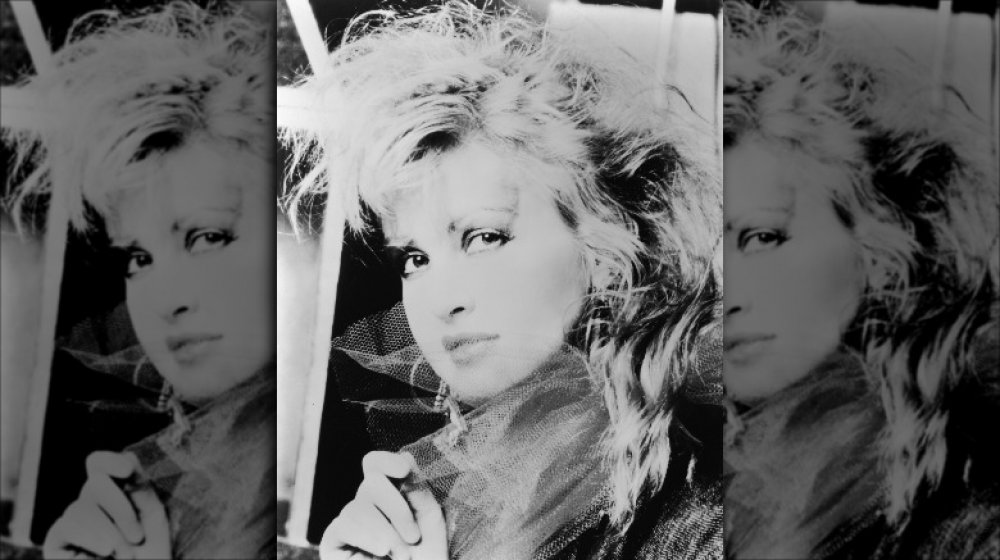The Tragic Real-Life Story Of Cyndi Lauper
Cyndi Lauper is the very personification of 1980s pop music. Her wild style of dress and dyed hair — both inspired by the New York punk scene — were pretty outlandish for the time, giving her debut album its title: She's So Unusual. However, the songs themselves were not unusual, but timeless bangers, iconic anthems, and enduring torch songs. Lauper, the Grammy Award winner for best new artist in 1985, used her huge voice to sing the heck out of tunes like "Girls Just Want to Have Fun," "Time After Time," "True Colors," "She Bop," "All Through the Night," and "The Goonies 'R' Good Enough." In more recent years, she became an elder stateswoman of pop, trying out different genres and even writing a hit Broadway musical.
But along with those big professional triumphs came plenty of tragedies, heartbreaks, and terrifying moments for the charismatic and truly original Lauper. Here are some of the tougher moments in the Cyndi Lauper life story.
Cyndi Lauper's childhood was violent and traumatic
True artists pull from real life to make their work personal and empathetic, be they writers, filmmakers, or singers. Many can take what they experienced as children and use it to propel them on their creative journey. Raised in the Roman Catholic faith, Cyndi Lauper recounted in Boze Hadleigh's Inside the Hollywood Closet the time a nun attacked her after catching a nine-year-old Lauper scratching a friend's back: "A nun ran in, ripped me off her back, threw me against the lockers, beat the s**t out of me, and called me a lesbian." Unfortunately, the future pop icon wasn't treated much better by classmates. "When I was a kid, I dressed differently, so people threw rocks at me," she told The Times in 2008.
Lauper faced a difficult home life, too. According to WE TV, she grew up in the working-class Ozone Park neighborhood of Queens. Her father left the family when she was 10, and her mother remarried a man the Mirror described as a "violent bully" in its coverage of Cyndi Lauper: A Memoir. In the book, Lauper revealed that after her stepfather threatened to sexually assault her and her sister, and then secretly watched Lauper take a bath, she left home for good. She was only 17.
She had a horrible time trying to live on her own
After leaving home at age 17 to escape a frightening stepfather, Cyndi Lauper lived a meager and itinerant existence. According to her memoir (via Bullyville), she'd work odd and low-paying jobs, but still would find herself without enough money to eat, so she'd busk to get some cash for food. At one point, her boyfriend at the time hunted and shot a squirrel, which she cooked up and ate. Lauper also faced an unplanned pregnancy, which she wanted but her boyfriend did not. So, Lauper terminated the pregnancy.
"Nobody wants to run in and do that," Lauper later told HuffPost. "It's just that I didn't want to have a kid that I love come into the world and not be able to share the kid with a dad." During this period, Lauper got around by hitchhiking, putting her into close quarters with some potentially unsavory individuals, such as the man who gave her a ride and forced her to perform an act on him: "I just wanted to be able to live through it, get to the other side of it." On another occasion, she was assaulted by a bandmate and two accomplices.
Sometimes, it all understandably got too overwhelming for Lauper. "A lot of times I couldn't take it anymore, so I just lay in bed all the time," Lauper wrote. "When I really couldn't deal with anything, I used to get the shakes, just complete anxiety attacks."
Cyndi Lauper blew out a vocal cord
About a decade before she found international fame and fortune for her singing, it looked like Cyndi Lauper may have had to change career paths, find a new dream, and live in a parallel universe where "Time After Time" never existed. According to Stuff, while singing a cover a Kiki Dee's "I've Got the Music in Me" one night in 1974, her voice gave out. But it returned soon thereafter, and Lauper continued to sing in cover bands and a Janis Joplin tribute act. It's hard work to sing in the late Joplin's bluesy, anguished, give-everything style, and in 1977, Lauper's pipes said no more. Her voice disappeared again, and doctors discovered that she'd suffered a collapsed vocal cord.
Recommended by her temporary replacement in the Joplin cover band, Lauper sought the help of vocal coach Katie Agresta. Not only did she help heal Lauper and provide her with tools and techniques to prevent it from happening again, Agresta also helped Lauper realize that she was singing the wrong music entirely, discovering that she was more suited to pop, not hard rock. As Lauper wrote in her memoir, "[I realized] what I was aching for — to sing my own songs, in my own voice, in my own style, that I made up myself."
She chose band over solo career and paid dearly
She's So Unusual was Cyndi Lauper's first solo album, but it wasn't the first time she'd commercially released music. Combining a New Wave look with a '60s throwback sound, Blue Angel, fronted by Lauper, put out a self-titled LP in 1980. Allman Brothers Band manager Steve Massarsky managed to hear the band's early demo tape. "The playing was bad. There was something interesting about the singer's voice, but that was all," he later told Rolling Stone. After seeing the band perform, he bought out Lauper's contract from her previous manager, and set up a showcase for Blue Angel to play for various record company reps. They all shared Massarsky's initial thoughts: the band wasn't great but the singer was something special.
However, Lauper refused to go solo, even turning down the chance to record a song by herself for the soundtrack to the Meat Loaf movie Roadie, produced by legendary disco song crafter Giorgio Moroder. She held firm, and the label eventually relented and allowed Blue Angel to make and ship its album ... which completely flopped.
According to Classic Pop, the band then fired Massarsky from his manager post. He sued for $80,000, and Lauper didn't have the money to pay him off nor fight the case. So, she filed for bankruptcy. Ironically, this did allow Lauper to pursue a solo career, except she lost her voice again, this time because of a cyst on a vocal cord.
Cyndi Lauper's career inexplicably declined
Cyndi Lauper's solo debut, She's So Unusual, exploded in 1984. Lauper sent four of its singles into the Billboard Hot 100's top 5, including "Girls Just Want to Have Fun" and "Time After Time." As the '80s wore on, she continued to release big hits like "True Colors" and "I Drove All Night," the latter of which reached No. 6 in 1989 — Lauper's last top 40 single to date. After a long string of smashes, Lauper's career took a sudden, almost inexplicable nose dive. Both She's So Unusual and True Colors had been certified multi-platinum; A Night to Remember was, according to The New York Times, "lackluster."
Shortly after that album was met with relative shrugs, and a split with boyfriend and manager David Wolff, Lauper found herself living alone in a New York hotel, emotionally drained and considering suicide. "I had come so far but felt like I had failed," she wrote in Cyndi Lauper: A Memoir (via Bullyville). "I would go to the studio, and then sit in my dark room and drink vodka. I had to spend most of my time alone. I was grieving. I thought the sadness would never go away." In an indirect way, it was Lauper's best-known song that encouraged her to try to crawl out of her low place: "The only thing that always prevented me from suicide is that I never wanted a headline to read, 'Girl who wanted to have fun just didn't.'"
If you or someone you know is having suicidal thoughts, please call the National Suicide Prevention Lifeline at 1-800-273-TALK (8255) or text HOME to the Crisis Text Line at 741741.
Cyndi Lauper's struggle with psoriasis
"The heartbreak of psoriasis" was once a catchphrase for products that treat that medical condition, which the Mayo Clinic notes is a skin disease that usually manifests as "red, itchy, scaly patches" on the scalp, elbows, knees, and midsection. But it can go far beyond an irritated scalp and itchy elbows with more severe symptoms.
While on tour, Cyndi Lauper first started to develop pains in her scalp, which she attributed to having just dyed her hair. A doctor later diagnosed it as psoriasis, which first turned into a flaky scalp, then a rash, and then it spread. Lauper later told the National Psoriasis Foundation in 2015 that it eventually felt like she had full-body psoriasis, with pain so bad she'd have to spend whole days in bed. "I had to work. So I stopped that," she said, adding, "This was the heartbreak."
Before she was about to head out on tour with Cher, she suffered from inflammation on her arms, legs, stomach, and had to cover up areas left exposed by her stage costumes with extensive makeup. To treat it, she tried coffee enemas, which helped her skin, but caused her to lose her voice. She later found a treatment that works, but also leads to suppressed immunity. "I'm not talking about it because I feel sorry for myself," Lauper explained. "I'm talking about it because no one talks about it ... and a lot of times you feel alone. I know I felt alone."
Cyndi Lauper lost an uncle in Hurricane Sandy
Cyndi Lauper was born and raised in Queens, New York, and some members of her family never left. Her uncle, George Stathis, lived in the Rockaway Park neighborhood for decades. Tragically, that area was violently ravaged in 2012 when Hurricane Sandy struck the East Coast — coastal areas of New York City in particular.
"He was old. He didn't want to leave his house," Lauper later said at a victims benefit concert (via Page Six). In Chicago at the time, Lauper called and asked relatives why they didn't try to get 90-year-old Stathis out of his home, who she said "didn't think it was going to get that bad." Well, we all know now that it unfortunately did. According to The New York Times, more than 100 people died in the chaos of Hurricane Sandy, and around half of them were of retirement age or older — including Lauper's Uncle George, for whom she performed her hit, "Time After Time," in a tribute at that benefit concert.
Cyndi Lauper was sued over her Broadway musical
Cyndi Lauper changed the course of her career in the 2010s. While theatrical legend Harvey Fierstein wrote the script, Lauper composed the music and lyrics for Kinky Boots, a big stage musical about a drag queen who saves a struggling shoe factory by producing fabulous high-heeled boots, which was based on the 2005 film of the same name. After a tryout in Chicago in 2012, Kinky Boots opened on Broadway in 2013, where it ran for six years and netted Lauper a Tony Award for best original score.
A career-capping work that reminded the world how it once cherished Lauper? Sure. But not if you ask '80s one-hit-wonder Benny Mardones and his songwriting partner, Robert Tepper. According to Courthouse News Service, the pair filed a federal suit against Lauper in 2017, alleging that she stole parts of Mardones' one and only hit, "Into the Night," for the Kinky Boots song, "Raise You Up." In their filings, Mardones and Tepper claimed that "both the notes and the words surrounding the 'raise you up' refrain" were lifted from the "pick you up" section of "Into the Night," and that the two songs have the "exact same progression of tones and rhythm."
Two years later, Mardones, Tepper, and Lauper settled the case, putting just a few scuff marks on the singer's Kinky Boots comeback success.









